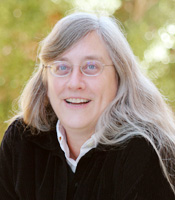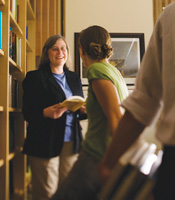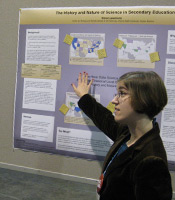|
February 29, 2012
Dear Board Member,
|
| |
|
Thanks to all who participated in last week’s meeting at ASU in Tempe. We will follow up soon with dates of future events and meeting notes.
|
|
|
For our February update, we introduce Jane Maienschein, a noted expert on the history of science and author of the book, “Whose View of Life? Embryos, Cloning, and Stem Cells.” Following this interview, please review our monthly briefing on recent sustainability news and activities at ASU.
|
| |
|
|
Q&A with Jane Maienschein
Identifying change agents in science
|
|
|
|
Jane Maienschein is a Distinguished Sustainability Scientist at the Global Institute of Sustainability; a Regents’ Professor, President’s Professor, and Parents Association Professor at the School of Life Sciences (College of Liberal Arts and Sciences); director of the Center for Biology and Society; and adjunct senior scientist at the Woods Hole Marine Biological Laboratory. She specializes in the history and philosophy of biology and the way that biology, bioethics, and biopolicy play out in society. In 2010 she was named a CASE and Carnegie Foundation U.S. Professor of the Year.
|
|
|
How did you become involved with sustainability in your career?
I never thought of my work as connected with sustainability, since my primary research field is the history and philosophy of developmental biology. It wasn’t until I was nominated to be a Distinguished Sustainability Scientist and began working with Ann Kinzig in the Global Institute of Sustainability that I thought more about where the idea of sustainability comes from, what it means in changing contexts, and why it matters. Subsequently, I was encouraged to write on the history of sustainability for the AAAS members’ website, and that led to a project examining the history of biodiversity and sustainability.
|
|
|
What is your most important sustainability-related project now?
I’ve been working with a collaborative group at the Marine Biological Laboratory in Woods Hole, Massachusetts, to develop a repository for digital content on the history and philosophy of science. A new project along these lines focuses specifically on biodiversity and sustainability. This project will teach ASU undergraduate and graduate students to research and write peer-reviewed articles about the change agents who helped transform these fields. The articles will then be linked to related digital content – pictures, videos, interviews, and other articles – and also to the rich published literature of both the Biodiversity Heritage Library consortium and the E.O. Wilson-inspired Encyclopedia of Life, both of which are partners in the project. In addition, ASU’s Manfred Laubichler and Robert Page are leading a related project to connect this work on biodiversity and sustainability to the Global Classroom (a project funded by the Mercator Foundation), so that international teams will develop associated content to add to the collection. These collaborations will bring together research and learning in the best possible way and involve a mix of students and faculty members.
|
|
|
How will your sustainability-related work affect policy or other decisions?
My work in 1997-1998 as a Congressional Fellow and senior science advisor showed me that influencing decisions is a subtle process and results are difficult to trace. In fact, we often have the greatest impact when we simply provide those in power with research materials and ideas. This is a different approach than most researchers seek, but it is consistent with my conviction that education is a long-term process and the greatest impacts tend to come later rather than sooner. But if we can get students, members of the public, and even ourselves to continually ask the hard questions and push for better answers, we will have succeeded.
|
|
|
What world sustainability challenge concerns you most?
Willful ignorance. By that I mean the persistent efforts by some people to sow doubt and create confusion when there should be none – for example, the people who deny evidence of human-caused climate change. This is deplorable. If the facts are bleak, let’s face them. If they call for hard answers and hard work, let’s get moving.
|
|
|
|
|

Jane Maienschein
|
|
|

Dr. Maienschein advises students involved in history and philosophy of science projects.
|
|
|

A student presents her history of science project at an annual meeting of AAAS.
|
|
|
|
|

|
|
|
Highlights of ASU sustainability activities
|
| |
- Solar generating capacity at ASU reached 14.5 megawatts with the completion of the PowerParasol, a first-of-its-kind solar panel installation designed to shade more than 5 acres of ground-level parking spaces at the Tempe campus. The university now has 55 systems installed for a total of more than 58,000 solar panels, with new projects already underway at the Polytechnic campus. By the end of the spring 2012 semester, ASU intends to reach 15.3 megawatts of solar capacity.
Read more »
|
| |
- ASU has been named the beneficiary of a $10 million strategic investment fund from Virginia G. Piper Charitable Trust to improve all aspects of health care delivery. The fund will support new health care initiatives across all university academic units, including Health Outcomes @ ASU, the College of Technology and Innovation, and the Herberger Institute for Design and the Arts, among others. Piper Trust’s CEO said the new investment was made because “ASU produces remarkable results.”
Read more »
|
| |
- ASU’s Consortium for Science, Policy, and Outcomes ranks first in the world among university-based science and technology think tanks, according to a report from the University of Pennsylvania. The ranking is based on a worldwide survey of scholars, public policy experts, peers, and journalists. The Consortium’s goal is to develop knowledge and tools to connect scientific research with beneficial societal outcomes.
Read more »
|
| |
- Students in the College of Technology and Innovation have devised a way for the town of Gilbert, Ariz., to deal with dog waste at its Cosmo Dog Park. They designed an anaerobic digester system that will convert the organic waste to renewable energy, which will then be used to fuel a lamp at the park. The system is expected to be in place by April. The work is part of the College’s iProjects program that brings students and industry together to solve real world problems.
Read more » | See video »
|
| |
- A joint ASU-University of New Mexico team has been selected by the U.S. Department of Energy to compete in its 2013 Solar Decathlon. The Solar Decathlon pits 20 university teams from around world in a competition to build energy-efficient, solar powered houses that are also affordable and appealing to consumers. ASU’s team members will include Sustainability Scientists Christiana Honsberg and Matt Fraser, as well as ASU graduate students.
Read more »
|
| |
- Carlo Jaeger, the Julie Wrigley Visiting Senior Scholar at the School of Sustainability, has proposed a strategy for addressing the financial crisis in Europe and, possibly, the U.S. – green growth. In a series of ASU lectures aimed at sustainability faculty and students, Jaeger suggested that retrofitting the built environment, building new power grids for renewable energy, renewing Mediterranean forests, and developing new transport systems could turn investors around and transform the economy. Jaeger is head of the Potsdam Institute for Climate Impact and chair of the European Climate Forum.
Read more »
|
| |
|
Please feel free to email or call us with any questions or comments about this briefing.
Best regards,
|
| |
|
|
|










